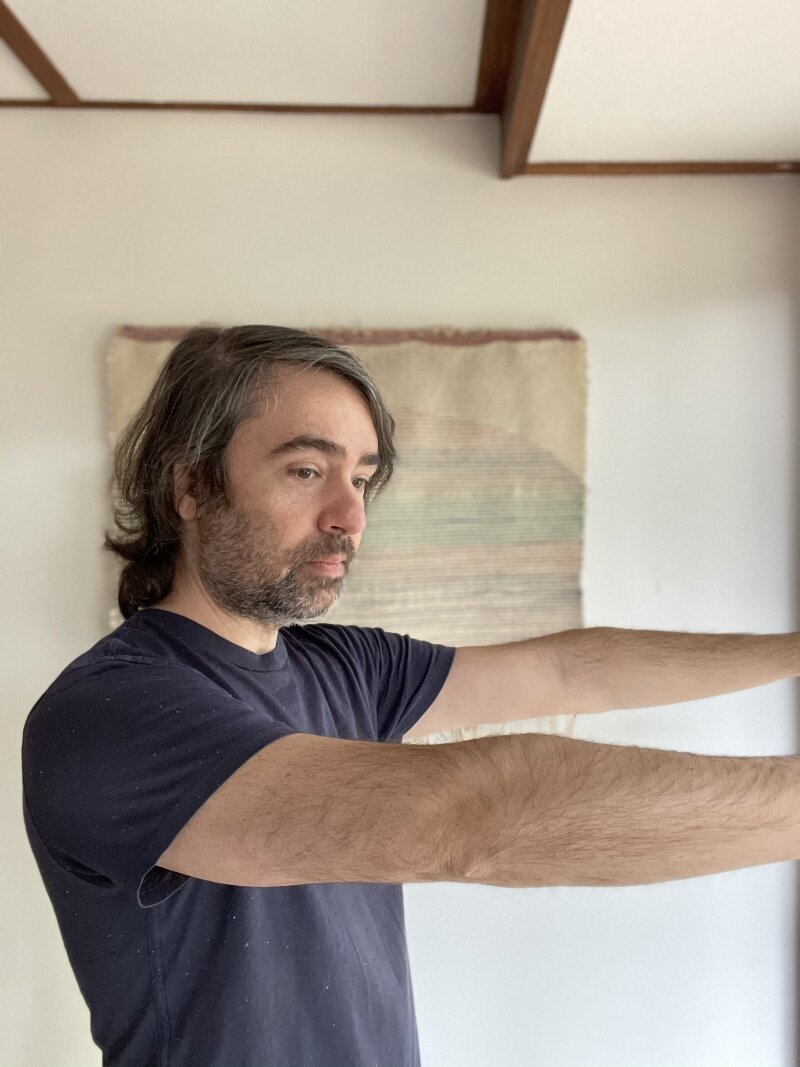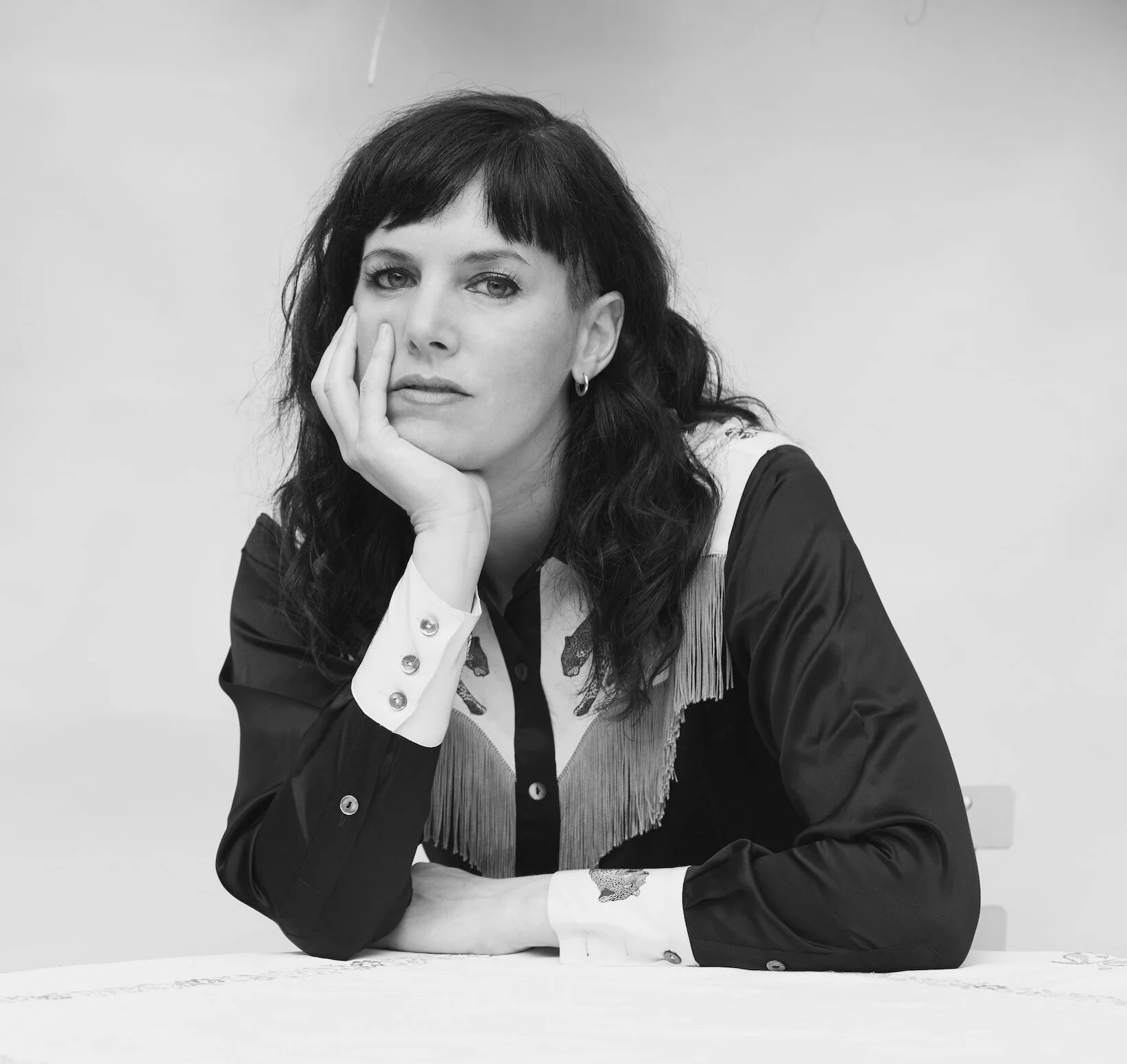DNTEL
Hailing from Los Angeles, Jimmy Tamborello has been a key figure in refining what today is considered electronica for over twenty years. The Seas Trees See is the first of two Dntel albums to be released in 2021 by Morr Music in collaboration with Les Albums Claus: a free-floating and rather loose stroke of musical genius, giving ambience a whole new meaningful context. It combines crackles and hiss with deep, yet modest, synths and poignant, yet elegant, vocals and lyrics. Away, its counterpart album, will follow later in 2021. It will showcase Dntel’s unapologetic love for pop music from a long-gone era, presenting yet another aspect of his multi-faceted personality.
Dntel has always covered many musical grounds – from the pop-infused hits on Life Is Full Of Possibilities (Plug Research, 2001) to his much more abstract works on Aimlessness (Pampa Records, 2012), Human Voice (Leaving Records, 2014), and his electronics for The Postal Service (Sub Pop).
Interview by Tyler Nesler
You've been making music in one way or another since 1989, and you've had wide-ranging commercial and creative success with various types of music from electro-pop, ambient, indie rock, and more. With such an expansive range of work, what would you say has been a unifying or connective feature of it all throughout the decades, if there is one?
Melancholy has always been my favorite musical mood. I have trouble avoiding a certain degree of cuteness. It’s a built-in instinct, probably defensive. I try to be aware of when it’s happening so it doesn’t reach embarrassing levels.
Mostly everything I’ve made I consider to be techno-pop. Sometimes it’s been in a more traditional sense, like Postal Service and Figurine, but even when I’m doing something more experimental I can’t help being drawn to pretty melodies and other more accessible tendencies.
You've collaborated with several musicians over the years, notably with Ben Gibbard with The Postal Service, which had a successful 2003 album Give Up. Your new album The Seas Trees See is also a collaboration with Les Albums Claus, the in-house publication label of Belgian organization Les Ateliers Claus.
Regarding their releases, Les Albums Claus says, "Each publication consists of at least one object with a proper artistic finality, blurring the lines between music, sound, visual and conceptual art." Could you elaborate on what exactly this unique organization does, and why you were specifically drawn to working with them for this release?
I’ve been friends with Tommy Denys (who runs Claus’s operation) for twenty years, so it’s really just a matter of wanting to work with my friend. For The Seas Trees See and Away (the other new album), Tommy was one of just a few people who were really encouraging me to finish and release this stuff. Ateliers Claus does so much to support artists and the label has put out a lot of music I like…
The opening track of The Seas Trees See is a cover/remix of Californian folk singer Kate Wolf's 1977 song "The Lilac and the Apple." Your version adds entirely different layers to her sparse acapella original, adding a kind of vocoder atmospheric eerieness other effects that drastically alter the sound of the original. What attracted you to remixing this song, and in what ways do you think your version of it underscores the poignant feel of the original version or even takes it into another realm altogether?
I originally remixed it just for use in some live ambient sets I was doing in 2019. It became a highlight of the sets but I didn’t think much about releasing it officially. But it kept inspiring more songs — really it was the starting point for The Seas Trees See. Most of the voices on the album are heavily altered folk acapellas.
When I was getting close to having an album finished I decided to reach out to her family just to see if there was even a possibility that they would allow me to use it (it samples almost the whole original song and also drastically alters her voice). They ended up being understanding and we were able to work it out.
There wasn’t much thought that went into the way I altered her voice and turned it into a duet, but when I heard it that way it really magnified the emotions for me. Also I liked the lyrics, they felt like a good central theme for the album.
The Seas Trees Sees, Les Albums Claus/Morr Music, 2021
The Seas Trees See will be accompanied by the "counterpoint" album Away, which will be released later in 2021. It will showcase your "love for pop music from a long-gone era." How will Away act as a creative counterpoint to the songs on this new album? What gave you the idea of releasing two works in a short period which will accentuate each other in different manners?
Away was a real struggle to make. It took a few years and there were stretches where I was working pretty non-stop. By the end of those nights sometimes the songs would be worse and I was really questioning what the point was. Most of the lyrics ended up being about this relationship with making things versus not being lonely. When I finally decided to be done with it I just accidentally started The Seas Trees See and finished it in a few months with very little stress.
I like imagining that The Seas Trees See is the album I’m referring to in the lyrics on Away. I almost called it What I Made (but I didn’t like how it sounded).
Also, Away is almost all vocal songs, with my voice in the front of the mix which made me self-conscious, it made me feel better to balance it with The Seas Trees See’s quiet.
You've said of The Seas Trees See, "I thought a lot about making an album that you would find in a thrift store...like a mysterious collection of sketches that leaves a lot unanswered. It doesn’t beg for attention or have any big moments." In an increasingly less analog world, what do you value about sifting through found objects such as old photos or discarded mementos, or obscure vinyl? Are we losing a vital sense of mystery and discovery when everything now is so personally curated through digital algorithms?
I do think I perceive a record differently if I discover it in a thrift store and know nothing about it versus buying that same record as a fancy reissue with liner notes. The thrift store version you want to love and defend, while the reissue needs to prove something to you. I still buy tons of reissues, though.
The Seas Trees See is an album that would not survive the way I consume music on the streaming apps — judging songs by skipping through them, listening to a couple seconds to get the idea, and then throwing albums into a big playlist and listening on shuffle.
Really there’s too much discovery the way we consume music now. With access to everything I find myself almost never listening to things multiple times. I’m more interested in constantly being surprised and hearing new ideas. When I was a teenager I’d maybe get to buy a couple new CDs a month. Whatever I got, I was stuck with, so even if I wasn’t that into something I’d still listen to it in its entirety over and over. Sometimes it took a lot of listens to realize I actually loved an album. Now music that isn’t immediate usually just gets lost.
Both ways have positives and negatives, who knows. As a listener I like the access to everything and I can still go into old fashioned mode and sit and listen to whole albums on vinyl. As a music-maker maybe it seems harder to get listeners to really pay attention, but who cares. You can’t force people to experience art in a specific way or the way that you intended as the artist.
With the album's fuzzy tones and nostalgic and atmospheric samples, I immediately thought of the work of the legendary duo Boards of Canada. Were they or anyone else in particular an influence on your production approach with The Seas Trees See?
Boards of Canada weren’t really in the front of my mind while I was making this but they had a big impact on me when I was younger, so I’m sure they’re in there somewhere. For stuff from back then it’s probably more the shoegaze groups that started going more electronic and also early Morr Music (coincidentally!). Plus a lot of current new age music, like what Leaving Records has been doing. Some of the songs were first made for Leaving Records Listen To Music Outside in the Daylight Under a Tree park concert series.
I think the biggest influence on the sound was that I was writing in Ableton Live (which is not the DAW I’m most comfortable with) with a new controller, so most songs started as longer improvised jams done kind of clumsily with a set handful of loops. I tried not to spend too much time refining or overthinking.
I've read that in recent times you've preferred to craft music away from the studio, in more relaxing environments. What's an ideal setting for you when it comes to writing music, and how have these quieter and more isolated times helped or hindered your process?
I find inspiration in old photos of musicians in front of interesting studio setups, I think by setting up cool looking music-making dioramas I can place myself into one of those old photos and find some romance in the creative process. Also, the studio is a dark room, so when I set up away from there it’s usually in front of a window in a part of the house where I already spend a lot of time (usually where the TV is).
For the first few months of the pandemic I was extra inspired and working a lot, that’s when most of The Seas Trees See was made, with a laptop and controller on the dining table next to the kitchen. I had already been pretty isolated before the pandemic, so I think when it started my mood actually improved because I no longer felt guilty that I wasn’t going out. Eventually the heaviness settled in though. Overall I think I have the same amount of creative struggle with or without a pandemic.
The Seas Trees See is available now
You might also like our interviews with these musicians:
Tyler Nesler is a New York City-based freelance writer and the Founder and Managing Editor of INTERLOCUTOR Magazine.






